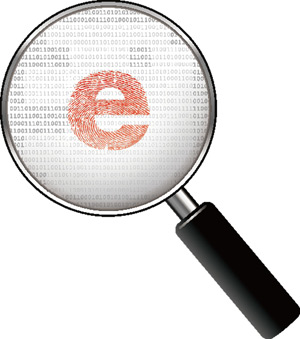 |
CCST9029 Scientific and Technological Literacy
|
Course Description
 The Internet (aka cyberspace) has become a platform in many arenas, including social, cultural, and public policy. Consequently, great amounts of information and data transmitted by and stored in cyberspace are vulnerable to attack by hackers and abuse by Internet users. Moreover, some cyberspace users perform unethical or criminal acts with the belief that his or her identity cannot be reviewed in cyberspace, such as sharing of copyright-protected materials and spreading of rumours.
The Internet (aka cyberspace) has become a platform in many arenas, including social, cultural, and public policy. Consequently, great amounts of information and data transmitted by and stored in cyberspace are vulnerable to attack by hackers and abuse by Internet users. Moreover, some cyberspace users perform unethical or criminal acts with the belief that his or her identity cannot be reviewed in cyberspace, such as sharing of copyright-protected materials and spreading of rumours.
This course will adopt a holistic approach to introduce the fundamental concepts of cyberspace crime, not only from the technological point of view, but also from the legal and ethical points of view. Through the discussion of different case studies, the course aims to help students to become a scientifically and technologically equipped and responsible individual and citizen. The topics of these case studies include: internet piracy, internet privacy and data leakage, freedom of speech in cyberspace, online pornography, and cyberspace theft. Famous cyberspace crime and non-crime cases in Hong Kong and the rest of the world will be included.
Course Learning Outcomes
On completing the course, students will be able to:
- Demonstrate understanding of what actions or application of technology in our everyday life might constitute a crime in the cyberspace.
- Describe and explain the legal challenges of cyberspace crime in Hong Kong.
- Formulate arguments in responding to cyberspace crime related ethical issues.
- Demonstrate understanding of real-world issues relating to the balance between the use of cyberspace technologies, legal challenges and ethical responsibilities.
Offer Semester and Day of Teaching
First semester (Wed)
Study Load
| Activities | Number of hours |
| Lectures | 24 |
| Tutorials | 10 |
| Assessment: Essay / Report writing | 50 |
| Assessment: Presentation (incl preparation) | 40 |
| Assessment: Quiz | 20 |
| Total: | 144 |
Assessment: 100% coursework
| Assessment Tasks | Weighting |
| Quizzes | 40 |
| Case study and final project | 30 |
| In-class presentation / Class discussion | 30 |
Required Reading
- Aker, P. (2007, November 6). Schools’ Internet filters let in porn. The Columbus Dispatch. From http://www.dispatch.com/content/stories/local/2007/11/06/School_Porn.ART_ART_11-06-07_A1_L98CSNE.html
- Department of Justice, The Government of the Hong Kong Special Administrative Region. (2011). The Prosecutions Division. From http://www.doj.gov.hk/eng/about/pd.html [Obscene articles and child pornography]
- Dillner, M. (2000, January). Internet safety and ethics for the classroom. Reading Online. From http://www.readingonline.org/editorial/edit_index.asp?HREF=/editorial/ethics.html
- Donoghue, A. (2008, August 15). Growth in password theft from online games. SC Magazine UK. From http://www.scmagazineuk.com/growth-in-password-theft-from-online-games/article/115454/
- Filby, M. (2007). Big crook in little China: The ramifications of the Hong Kong BitTorrent case on the criminal test of prejudicial effect. International Review of Law Computers and Technology, 21(3), 275-283.
- Hong Kong Police Force, The Government of the Hong Kong Special Administrative Region. (2011). Technology crime. From http://www.police.gov.hk/ppp_en/04_crime_matters/tcd/index.html
- Information Services Department, The Government of the Hong Kong Special Administrative Region. (2008, September 25). Secretary for Security talks about crime situation [Press release]. From http://www.info.gov.hk/gia/general/200809/25/P200809250258.htm
- Legislative Council Panel on Home Affairs. (2008). Protection of personal data privacy [LC Paper No. CB(2)2454/07-08(01)]. From http://www.legco.gov.hk/yr07-08/english/panels/ha/papers/ha0704cb2-2454-1-e.pdf
- Matte, C. (n.d.). Why you may need an Internet filter. From http://familyinternet.about.com/od/computingsafetyprivacy/a/needfilter.htm
- Moy, P. (2008, July 17). Child porn hoarders may be locked up for 3 years. The Standard. From http://www.thestandard.com.hk/news_detail.asp?pp_cat=11&art_id=68738&sid=19788009&con_type=1&d_str=20080717&isSearch=1&sear_year=2008
- Office of the Privacy Commissioner for Personal Data, Hong Kong. (2008, June 5). The Director of Immigration Department signed formal undertaking [Media statement]. From http://www.pcpd.org.hk/english/infocentre/press_20080605.html
- Twist, J. (2005, February 25). Solutions to net security fears. BBC News. From http://news.bbc.co.uk/2/hi/technology/4273135.stm
- Weinstein, S., & Wild, C. (2007, April). The Hong Kong BitTorrent Case: Why should big crook do down big time for a little infringement? Paper presented at the 22nd BILETA Annual Conference 2007, Hertfordshire. From http://www.bileta2007.co.uk/papers/images/stream_6/WeinsteinS_WildC.pdf
- Wong, K. C. (2005). The discovery of computer crime in Hong Kong: A case study of the crime creation process. Journal of Information, Law and Technology, 2005(1). From http://www2.warwick.ac.uk/fac/soc/law/elj/jilt/2005_1/wong/
- Yoskowitz, A. (2008, September 22). 14-year-old arrested for music uploads. Afterdawn. From http://www.afterdawn.com/news/archive/15458.cfm
Recommended Reading
- Baase, S. (2003). A gift of fire: Social, legal, and ethical issues for computers and the Internet. Upper Saddle River, NJ: Pearson Education.
- Himma, K. E., & Tavani, H. T. (Eds.). (2008). The handbook of information and computer ethics. Hoboken, NJ: John Wiley & Sons, Inc.
- Spinello, R. A. (2003). Case studies in information technology ethics and policy (2nd ed.). Upper Saddle River, NJ: Prentice Hall.
- Spinello, R. A. (2014). CyberEthics: morality and law in cyberspace (5th ed.). Sudbury, MA: Jones and Bartlett Publishers.
Recommended Websites
Course Co-ordinator and Teacher(s)
| Course Co-ordinator | Contact |
| Dr K.P. Chow Department of Computer Science, Faculty of Engineering |
Tel: 2859 2191 Email: chow@cs.hku.hk |
| Teacher(s) | Contact |
| Dr K.P. Chow Department of Computer Science, Faculty of Engineering |
Tel: 2859 2191 Email: chow@cs.hku.hk |

